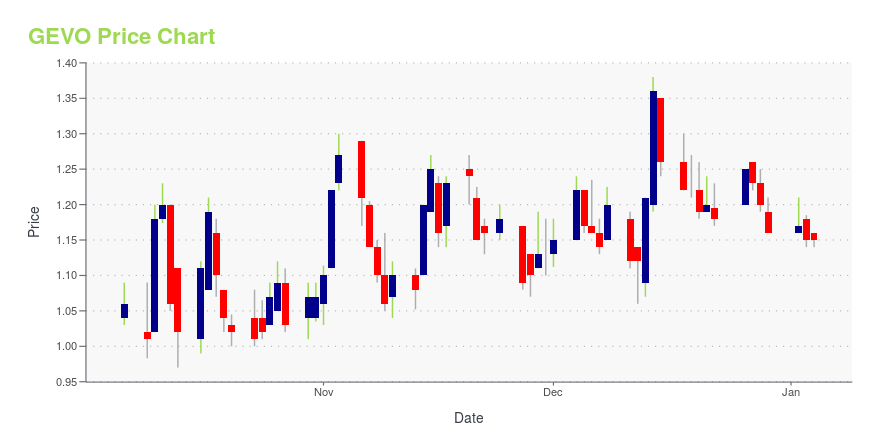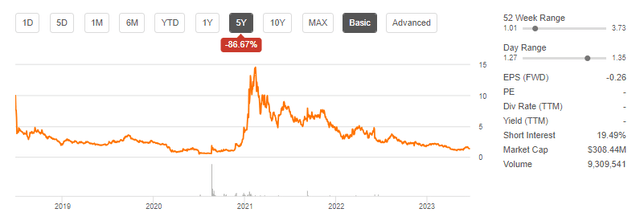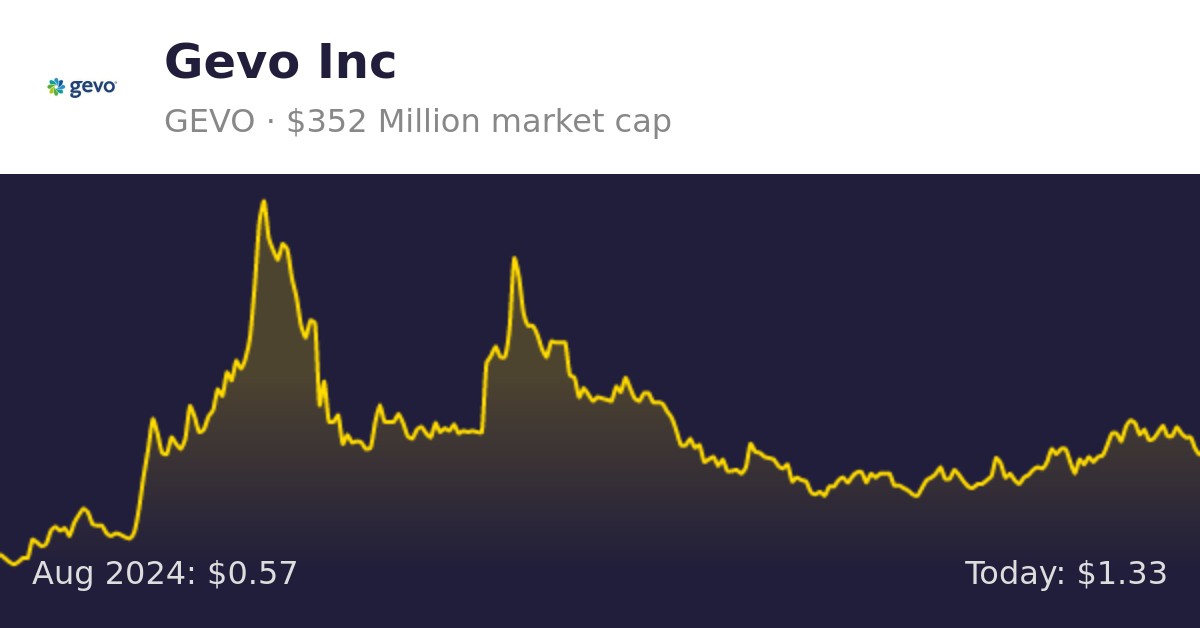Gevo Stock Price Raised To $50

The biofuels sector witnessed a jolt of optimism as analysts at Roth MKM significantly raised their price target for Gevo, Inc. (GEVO) from $9 to $50 per share. The revised target reflects a substantial increase in confidence regarding Gevo's potential to capitalize on the growing demand for sustainable aviation fuel (SAF) and other renewable energy products.
This dramatic price adjustment, though met with excitement by some investors, prompts a critical examination of Gevo's current financial standing, production capabilities, and the broader market dynamics influencing its future prospects. The biofuel company now faces increased scrutiny as it navigates the complexities of scaling production, securing long-term contracts, and proving the viability of its technology in a competitive landscape.
The Nut Graf: Examining the Rationale Behind the Price Hike
The core reason for Roth MKM's bullish stance lies in their belief that Gevo is strategically positioned to become a major player in the SAF market. This belief is underpinned by several factors, including the Inflation Reduction Act's incentives for renewable fuels, increasing pressure on airlines to decarbonize, and Gevo's proprietary technology for producing SAF from renewable resources like corn.
The $50 price target hinges on Gevo's ability to execute its business plan, particularly the successful development and operation of its Net-Zero 1 (NZ1) plant. NZ1 is projected to be a key driver of revenue and profitability, showcasing Gevo's commitment to producing low-carbon fuels at scale.
Detailed Analysis of Gevo's Business Model and Financials
Gevo's primary focus is on producing SAF and other renewable hydrocarbons from renewable resources. Their technology utilizes a proprietary process that converts renewable feedstocks into isobutanol, which can then be further processed into SAF, renewable gasoline, and other high-value products.
The company currently operates a demonstration plant in Luverne, Minnesota, and is actively developing its first commercial-scale production facility, NZ1, in South Dakota. The successful completion and operation of NZ1 is paramount to Gevo's growth strategy and achieving its long-term financial goals.
Gevo's financial performance in recent years has been characterized by significant investments in research and development and the construction of NZ1. While revenue has been limited, the company has secured several offtake agreements with major airlines and other customers, indicating strong demand for its products.
According to their latest financial reports, Gevo is still operating at a net loss, but analysts expect profitability to improve significantly once NZ1 is operational and producing at full capacity. The company's ability to manage its debt and secure additional funding will be crucial to its long-term financial health.
Market Dynamics and Competitive Landscape
The demand for SAF is projected to increase dramatically in the coming years as airlines seek to meet their sustainability targets. Government regulations and incentives, such as those included in the Inflation Reduction Act, are further driving the demand for renewable fuels.
Gevo faces competition from other companies in the biofuel space, including established players like Neste and Renewable Energy Group (REG), as well as emerging companies developing alternative SAF production technologies. Successful differentiation through technology and cost-effectiveness will be crucial for Gevo to gain market share.
The cost of producing SAF remains a significant challenge, but Gevo believes its technology offers a competitive advantage in terms of carbon intensity and overall cost. The company's ability to secure long-term feedstock supply agreements and optimize its production processes will be key to reducing costs and improving profitability.
Expert Opinions and Industry Reactions
The analyst upgrade from Roth MKM has sparked debate within the investment community. While some analysts share the firm's optimism about Gevo's potential, others remain cautious, citing concerns about execution risk and the competitive landscape.
"Gevo has a compelling technology and a strong management team, but they still need to prove they can execute their business plan," said one industry analyst who preferred to remain anonymous. Another expert noted that "the SAF market is highly competitive, and Gevo will need to differentiate itself to succeed."
Gevo's management team has expressed confidence in their ability to meet the growing demand for SAF and deliver value to shareholders. In a recent statement, Patrick Gruber, Gevo's CEO, stated that "We are well-positioned to capitalize on the increasing demand for sustainable aviation fuel and other renewable hydrocarbons."
Risks and Uncertainties
Investing in Gevo, like any growth stock, carries inherent risks. The successful completion and operation of NZ1 is critical to Gevo's long-term success, and any delays or technical challenges could negatively impact the company's financial performance.
Fluctuations in feedstock prices and the regulatory environment could also affect Gevo's profitability. Changes in government policies related to renewable fuels or subsidies could significantly impact the company's business model.
Competition from other companies in the biofuel space is another significant risk. Gevo will need to continually innovate and improve its technology to maintain a competitive edge.
Looking Ahead: Gevo's Future Prospects
The $50 price target assigned by Roth MKM represents a significant vote of confidence in Gevo's potential to become a major player in the SAF market. However, the company still faces significant challenges, including the successful completion and operation of NZ1, managing its debt, and competing in a rapidly evolving market.
Whether Gevo can meet these challenges and deliver on its promises remains to be seen. Investors should carefully consider the risks and uncertainties before making any investment decisions.
The future of Gevo hinges on its ability to execute its business plan, capitalize on the growing demand for sustainable aviation fuel, and demonstrate the viability of its technology in a competitive landscape. The coming years will be crucial in determining whether Gevo can live up to the high expectations set by analysts and investors.


















